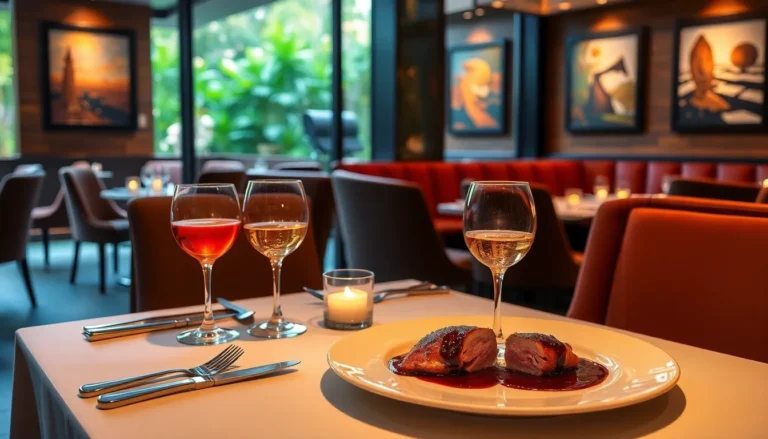Table of Contents
ToggleRestaurant Week is like the holiday season for food lovers, where every bite feels like a gift from the culinary gods. For one glorious week, diners can indulge in gourmet meals at a fraction of the price, making it the perfect excuse to explore new flavors without breaking the bank. Who wouldn’t want to treat their taste buds to a five-star experience while keeping their wallet happy?
Overview of Restaurant Week
Restaurant Week showcases gourmet dining at accessible prices. It’s an annual celebration where participating restaurants offer special fixed-price menus. Diners can enjoy multiple courses at a fraction of the regular cost, typically ranging from $20 to $50 per person.
Cities across the United States participate, creating local culinary events that highlight the diversity of cuisine. Restaurants may feature their signature dishes or experimental creations, enticing diners to explore new flavors and experiences.
Promotional efforts often include social media campaigns, posters in restaurants, and local media coverage to maximize awareness. Restaurant Week encourages patrons to make reservations early, as spots tend to fill quickly due to high demand.
Connecting with the community, this event often also supports local charities. A portion of proceeds may be donated to various organizations, enhancing the festive atmosphere while promoting goodwill.
Ultimately, Restaurant Week serves as a bridge between culinary experts and food lovers, transforming dining into a more affordable and enjoyable experience.
History of Restaurant Week

Restaurant Week has roots in the mid-1990s when Jonathan Waxman, a New York City chef, created it to celebrate the culinary scene. This initiative aimed to attract diners during a slow period by offering special menus at lower prices. It quickly gained traction, showing success in increasing restaurant patronage while allowing diners to explore new dining experiences.
Cities across the United States embraced the concept of Restaurant Week. As awareness spread, many culinary capitals began organizing their own events. Restaurant Weeks now occur in numerous cities, featuring a variety of cuisines and promoting local dining establishments. Each city puts its own twist on the event, adding unique flavors and flair. Promotional efforts help engage communities, encouraging residents to support local businesses during these culinary celebrations.
Participating Restaurants
During Restaurant Week, numerous restaurants across various cities participate, offering diners unique culinary experiences at fixed prices. These restaurants aim to attract new customers while showcasing their signature dishes.
Criteria for Involvement
Participation in Restaurant Week often requires restaurants to meet specific criteria. Establishments typically need a valid business license and a commitment to provide a fixed-price menu. Quality and variety are essential; chefs strive to create enticing dishes that reflect their culinary style. Many restaurants also prioritize local ingredients, enhancing the community’s food culture. Additional factors may include the restaurant’s reputation and customer reviews, ensuring a diverse and appealing roster for guests.
Spotlight on Notable Restaurants
Several notable restaurants frequently participate in Restaurant Week, making the event a highlight. Established establishments like The French Laundry or Nobu attract attention with exclusive menus. Diners can indulge in gourmet offerings from famous chefs who craft distinctive dishes for the event. Local gems often emerge as favorites; they bring unique flavors and character to the dining scene. Popular choices often include family-owned bistros and trendy spots, combining tradition with modern culinary techniques. Each participating restaurant contributes to an exciting and diverse dining landscape during this special week.
Menu Offerings
Restaurant Week features a variety of enticing fixed-price menus, providing diners with affordable gourmet dining experiences. Each menu highlights the unique offerings of participating restaurants, encouraging culinary exploration.
Discounts and Special Packages
Discounts during Restaurant Week range from $20 to $50 per person. These fixed-price offerings often include multiple courses, such as appetizers, entrees, and desserts, creating a full dining experience. Many restaurants provide special packages that enhance the value, enticing customers to taste signature dishes or new items. Diners should explore different options as each participating restaurant crafts its own unique menu during this period.
Seasonal and Local Ingredients
Restaurants participating in Restaurant Week prioritize seasonal and local ingredients to showcase the region’s culinary strengths. Fresh produce, meats, and seafood from local farms enrich dishes, enhancing flavors and supporting the community. Chefs design their menus based on what’s available, often resulting in innovative creations that reflect current culinary trends. This focus on local sourcing boosts not only the quality of food but also promotes regional food culture, creating a deeper connection between diners and their community.
Community Impact
Restaurant Week significantly influences local communities through various avenues. This event generates economic benefits that boost local economies.
Economic Benefits
Participating restaurants often experience increased foot traffic, translating into higher sales and revenue. Local employment rises as restaurants hire additional staff to accommodate the influx of diners. Many studies show that each dollar spent in a local restaurant generates approximately $2.50 for the surrounding economy, amplifying the financial impact. Increased patronage during Restaurant Week enhances local tax revenues as well. These elements create a more vibrant culinary scene, fostering economic growth throughout the region.
Supporting Local Businesses
Restaurant Week encourages diners to explore local establishments, drawing attention to unique flavors and culinary offerings. Engaging in this week-long celebration promotes an ethos of community support, as residents discover hidden gems and local favorites. Many restaurants use locally sourced ingredients, showcasing the region’s agricultural strengths and supporting local farmers. Increased collaboration among businesses strengthens community ties and cultivates a network of support. This event sparks community pride, as food lovers rally around favorite dining spots, transforming the perception of local cuisine.
Restaurant Week is more than just a culinary event; it’s a celebration of local flavors and community spirit. By offering gourmet meals at accessible prices, it invites food lovers to explore diverse cuisines and support local businesses. This initiative not only enhances the dining experience but also contributes to the local economy, creating a ripple effect of benefits for restaurants and communities alike.
As diners indulge in unique dishes crafted from fresh local ingredients, they deepen their connection to their region’s culinary heritage. With its rich history and ongoing popularity, Restaurant Week continues to be a cherished tradition that fosters goodwill and culinary exploration. Embracing this week means enjoying exceptional food while making a positive impact on the community.








